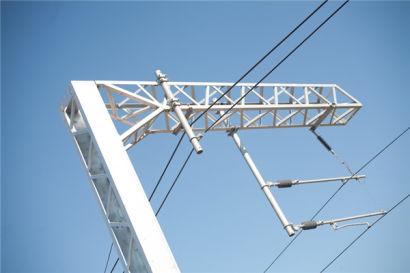IN a £2,000 million electrification extravaganza, Network Rail has let contracts extending over the next seven years.
The contracts involve electrification of over 3,200km (2,000 miles) of running lines – including the Great Western and Midland main lines, Liverpool to Manchester and Preston, the Valley lines in South Wales and the ‘electric spine’ from Southampton docks to the West Midlands and Yorkshire.
When the work is completed more than half Britain’s rail network will be electrified and electric trains will account for three-quarters of all traffic.
Six geographic framework contracts have been awarded, with each having a defined ‘workbank’ of schemes to be delivered. This approach has been endorsed by the supply chain and industry groups such as the Railway Industry Association, said Network Rail..
The companies involved are Balfour Beatty, AmeyInabensa, CarillionPowerlines and ABC Electrification.
Simon Kirby, managing director of Network Rail’s infrastructure projects division, said: “Our work to electrify 2,000 track miles represents the biggest programme of rail electrification in a generation and will provide faster, quieter and more reliable journeys for millions of passengers every week while cutting the cost of the railway.
“Thanks to a firm commitment from government to invest in electrification schemes across the country, we are transforming the railway and providing Britain with a sustainable, world-class transport system that is fit for the future. To deliver this work in the safest and most efficient way possible, we need to make the most of the huge potential within our supply chain.”
He continued: “The framework approach chosen by Network Rail gives suppliers a greater degree of certainty about the companies' pipeline of work and means suppliers can target investment so they have the right people with the right skills in the right parts of the country to deliver schemes which will improve our railway and boost economic growth.”
Jeremy Candfield, director general of the Railway Industry Association, commented: “This is a major and very welcome step in the transformation of the railway. It will encourage suppliers to invest in the training and equipment needed for the growing national electrification programme and pave the way for suppliers’ greater involvement to maximise the efficient delivery of the projects.”


